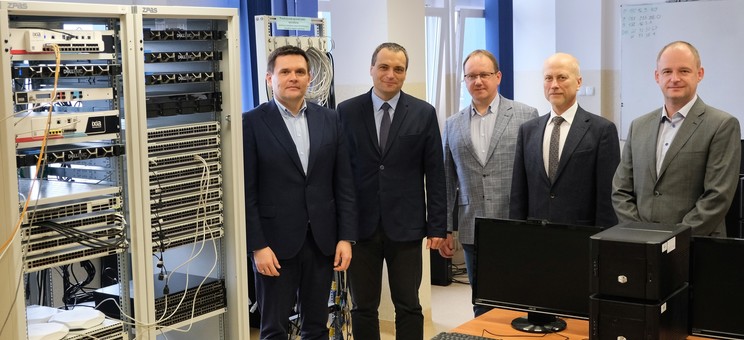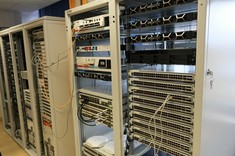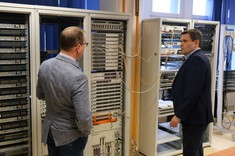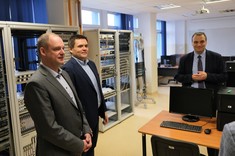Internet of Everything

The Internet of Everything testing stand was created in the Department of Complex Systems of the Faculty of Electrical and Computer Engineering. It is built from components that create a unique system for conducting basic research (theoretical and simulation), experimental development works and providing commercial services. A specialized testing stand can be used to study the phenomena and interactions accompanying the convergence and emergence of complex processes, hardware, application resources and people in contemporary and future ICT systems that currently create the Internet of Everything. The stand was created thanks to the involvement of Dominik Strzałka, BEng, PhD, DSc, Assoc. Prof., Marek Bolanowski, BEng, PhD, and Andrzej Paszkiewicz, BEng, PhD.
The constant and dynamic development of information technology means that we are witnesses of significant changes in the digitization of more and more areas in our lives. Thanks to the widespread of the Internet, not only web services have become available to the average user, but also many new interesting concepts have appeared, such as: e-business, social networks, access to audio and video content and the ubiquitous concept of digitization. One can get the impression that the Internet has become an immanent part of the surrounding reality. When not only specialized network devices, computers and servers, but also different devices and machines began to be connected to the network, the creation of the Internet of Things (IoT) was announced. Following this solution, the Internet has enabled gathering and processing large amounts of data and processes appeared that we now understand as cloud computing. As a result, Cisco pioneered a new concept called the Internet of Everything (IoE), which is defined as "the intelligent connection of people, processes, data, and things". In the Internet of Things (IoT), all communication is machine-to-machine, but the more expansive concept of IoE includes, in addition to machine-to-machine (M2M) communication, machine-to-people (M2P) interactions and assisted people-to-people (P2P) technology.
Rzeszów University of Technology, taking into account the development of IT technology and the aforementioned dynamic development of new concepts and ubiquitous digitization, launched the Internet of Everything testing stand at the Department of Complex Systems of the Faculty of Electrical and Computer Engineering. It is built of unique system components allowing basic research (theoretical and simulation), experimental development work and providing commercial services using real elements, such as:
advanced simulator of complex network systems with RiverBed Modeler and the ability to create your own devices, support for wired and wireless communication and integration of simulated virtual systems with elements of the real environment, supplemented with two auxiliary servers,
a set of four high-performance core switches and nine aggregation switches enabling the creation of test topologies with wireless communication modules, a management system and support for IoE class devices,
hardware traffic tester/generator enabling the definition of flows in all layers of the ISO/OSI model together with the necessary software,
- a security testing system based on BreakingPoint Keysight that allows to create flows that simulate the work of many IoE devices, taking into account normal and abnormal traffic (viruses, DDoS attacks, etc.),
- a module of high-performance computing servers, with multi-processor, multi-core architecture, supporting multi-threaded processes, virtualization of operating systems, parallelization of calculations and a significant improvement in efficiency for calculations of various simulation programs, also with the use of GPU cards, equipped with virtualization software and an advanced management model, monitoring system and event logging, a UPS system and a set of high-throughput switches guaranteeing data exchange between individual servers.
A specialized testing stand can be used to study the phenomena and interactions accompanying the convergence and emergence of complex processes, hardware, application resources and people in contemporary and future ICT systems that create the Internet of Everything by:
- modeling and testing multi-threaded computing processes in Industry 4.0/5.0,
- performance analysis of algorithms including: data mining, machine learning, process discovery, multi-criteria decision support systems,
- implementation and testing of anomaly detection algorithms in network traffic, high-performance enterprise-class processing systems, mainframes and communication structures in the IoE infrastructure,
- modeling of fluid flow using the computational fluid dynamics (CFD) method for optimization and design of complex separation systems for multi-component mixtures, in particular mixtures of pharmacologically active proteins,
- design and configuration of data processing systems, including genomic data obtained from Oxford Nanopore technology,
- research, exploration and analysis of cloud computing elements, including configuration and clustering of server systems (HA),
- tests of redundancy solutions and protection against errors and damage in the servers infrastructure,
- detection of anomalies in distributed systems, taking into account the correlation of operating parameters,
- modeling the reliability of distributed systems and their fault tolerance,
- connecting infrastructure elements simulated in a virtual environment with real systems and devices.
The concept of the Internet of Everything as a result of the global evolution of the Internet is not only available to devices, e.g. computers, smartphones, tablets, but also enables universal connectivity and data exchange by many objects of the real and virtual world, including people and processes. It is a new, distributed ecosystem that provides multiple, multi-level interactions between individual elements using the Internet.
The Internet of Everything testing stand ensures that the Rzeszów University of Technology has the appropriate technical and organizational potential to carry out research and development works through access to unique, high-performance equipment, software and databases, appropriate computing power and know-how in the field of collecting and processing data and processes on the Internet. An important element of the launched testing stand is also the possibility to carry out work in the field of cyber security through tests, simulations and raising the awareness of users in the field of cyber threats.










